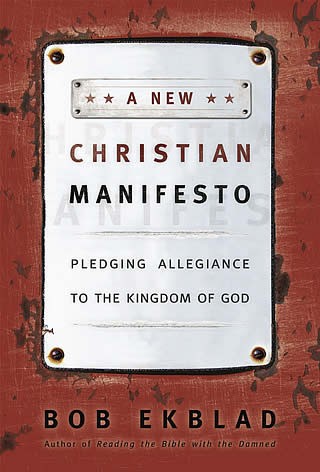Aliens and margins

Bob Ekblad’s new book, A Christian Manifesto (Westminster John Knox) has been dominating my thinking over the past few weeks. It’s a bold call to Christians to make themselves aliens to the dominant powers of culture – especially militarism, nationalism, and violence – and relocate at the margins of society alongside the poor, illegal immigrants, prisoners, and addicts.
He draws together his work as a scholar, contemplative, activist, evangelist, and charismatic, each role informing the other. The book is a distant relative to Francis Schaeffer’s Christian Manifesto, specifically addressing the American political and religious climate, but the challenge to renounce all other allegiances in service of God’s Kingdom is for all Christians.
He writes a lot about charismatic experiences, especially healings, and that sort of thing makes me squirm. Miraculous encounters with God sometimes seem like membership cards in a special club, and anyone without one simply doesn’t have enough faith.
Obsess over the spectacular you’re likely to miss the wonder of the everyday. But the “everyday” for Ekblad is work with illegal immigrants and prisoners in Washington, and what he seeks is real change for those he serves.
I also shy away from talk of miracles because it’s usually hyper-individualistic and self-centred, but Ekblad sees the structural forces of evil more clearly than the usual charismatic evangelist. His analysis of social structures is like a fired up sermon from a preacher who reads a lot of Chomsky.
It’s a thunderous, prophetic critique of culture and contemporary Christianity, as strong as Jacques Ellul and as compelling as Shane Claiborne, though the strong Christian language might put some people off.
4 Comments
Sorry, comments are closed.


Thanks for reviewing Bob’s book. He speaks from a place of integrity after working for decades at the margins with the poor and oppressed.
Back in the Reagan years, when the death squads of American-backed dictators were torturing and killing peasants, Bob was on the ground in Guatemala and Honduras bringing relief. At the time, the most tyrannical of these presidents was an active Pentecostal, so whatever suspicions you would have about charismaniacs would be rather pale compared to Bob.
Indeed, Bob has never pursued healing and miracles for their own sake or for the spectacular effects around it. Rather, when he’s sitting in prison with broken and violent men who’ve given up all hope, I’ve seen him first-hand lead the little study group of gangster and illegals in a simple one- or two-line prayer for someone in chronic pain. The presence and mercy of God rests among them and the fruit of their compassion is regularly … no, USUALLY, healing. It’s a far cry from the hucksters and flamboyancy to which you (rightly) have an aversion.
But the issue there is not miracles and healings, but whether God is doing them or not. When he is, truly is, would our pride reject his work? I dare say that we would neither shy away from miracles or the talk of miracles if it was our own child who was born blind receiving her sight for the first time (as Bob witnessed in Malawi and Mozambique); or your wife who was finally relieved and released from chronic nerve damage and back injuries, actually getting her life back (as in my case).
What I’m getting at is that context makes certain talk seem shallow. So from my study where I engage in theological and political discussions of great import, the healing and miracles stuff seems a bit thin, a bit shallow. But flip that into a third world village where there is no medical facility for the deaf, the blind, the leper, the cripple … and Jesus shows up (borrowing Bob’s kind hands) to start to heal them FOR REAL. My theology and politics then seem like fluff to be blown away in the wind. At that point, no one is shying away from talk of miracles. They are “walking and leaping and praising God.” I would hope in those moments that none of us would be so cool that we could stand aloof and critical.
Thankfully, Bob has found what I regard as the best integration of all of this: political, economic, spiritual and physical oppression all brought under the Lordship of Jesus. I know Bob and have worked with him and can say this for the reader: he’s the real deal.
Brad Jersak August 2nd, 2008 8:47am
Astounding stuff, and on a more trite note I love the cover design of the book.
Nick McGivney August 3rd, 2008 3:46am
Interesting. Will have to check it out. And I agree with Nick – cool cover.
Jeff Goins September 30th, 2008 10:18am
The problem is, is this a “new manifesto”? I think not. I think it’s the same stuff that Jesus exemplified in the first place. Why do we need new authors to keep telling us the same stuff? Maybe new metaphors and examples hit different people in different places in their heart, but at the end of the day, we KNOW that Jesus was a radical, living on the fringes, homeless, wandering, befriending the people nobody else was. If we dont’ already know this about him, who exactly do people think this “christ” is that they are following? It’s not new stuff, and if it’s new to people, then they haven’t been reading the stories about Jesus that I have. Don’t we get it yet? don’t we get it?
Natalie November 30th, 2008 4:42pm